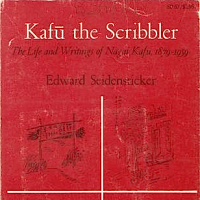"A querulous, self-righteous man, whose social criticism rarely rose above the level of personal complaining ... ."
Kafu the Scribbler, by Edward Seidensticker
368 pages.
Stanford University Press, Nonfiction.
If this is how the writer Nagai Kafu struck his biographer and translator, Edward Seidensticker, what are the rest of us to think?
Two possibilities. One: Here's a biographer who is not in thrall to his subject — not a bad thing, surely. Two: Character flaws are as apt to enrich a writer's work as impoverish it, and Kafu's flaws do rather a lot of both. You read him with mingled admiration and repugnance, the former because he really is a very fine writer, the latter because ... well, he is querulous and self-righteous, and there are times when he annoys the hell out of you.
He was a cranky solitary, one of whose major themes is cranky solitude. Another is the erotic demimonde made up of geisha, licensed prostitutes and, later on in his long career, unlicensed prostitutes — a personal degradation reflective, he felt, of the increasing degradation of his times as a grating industrial and military future encroached hatefully on a vanishing, mistily poetic past whose spokesman he appointed himself to be.
"Kafu the Scribbler" is half biography, half anthology; a sort of collaboration between two very fine writers. "I am utterly indifferent to what my family thinks of me," Kafu wrote. "I am a poet; they are ordinary human beings."
It's not a nice thing to say, but he was a poet. That much is undeniable.
Read archived reviews of Japanese classics at jtimes.jp/essential.


















With your current subscription plan you can comment on stories. However, before writing your first comment, please create a display name in the Profile section of your subscriber account page.